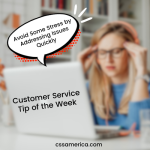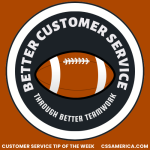I’m constantly flummoxed by executives who feel that the only good idea is a new idea, the only means to success is through their own innate creativity. A COO once told me that trying to create simplicity in operations for staff (so they could more consistently deliver a great experience to their customers) wasn’t challenging enough.
The best executives need to realize that there’s a multitude of great examples of customer service cultures and wonderful customer experiences in other businesses, other industries. And there’s no shame in learning from others to speed the transformation of an organization.
In the article City School District taking lesson from Wegmans, the Rochester School District announced that it was going to train staff on many of the same customer service principles and techniques that Wegmans Grocery Stores (with a reputation for great customer service) utilize. This includes quick issue resolution and fostering a WWWD (“What would Wegmans do?”) mindset.
The point is not to say that we all need to look to our local grocer for customer service tips. Rather, in Education or other industries (local government, healthcare, etc.) that are not always known for a great customer experience, sometimes it’s better not to look at industry peers. It’s best to look to those who have the reputation for being the best in a particular aspect of business. Think Zappos for culture, Chick-fil-A for consistent customer service in a transactional environment, or Amazon for personalization in a high tech/high volume world.
Speed the transformation of your customer’s experience by benchmarking with best-in-class performers OUTSIDE your industry.
Did you like this post? Here are other Education-related posts:






















